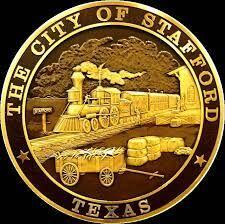Stafford council broaches considering property tax
Published: Tue, 11/14/23
Stafford council broaches considering property tax

The Fort Bend Star
By Ken Fountain KFountain@fortbendstar.com
November 13, 2023
Stafford City Council last week stepped on what has long been regarded as the "third rail" of Stafford politics, broaching on the idea of instituting a property tax in the city for the first time in nearly three decades.
Stafford, under then-Mayor Leonard Scarcella, abolished property taxes in 1995 and has long marketed itself as one of the few, if not only, municipalities in Texas without such a tax. Since then, the seven-square mile city directly abutting the City of Houston has relied almost entirely on sales taxes to collect revenues.
But in recent years, some residents and members of City Council have, somewhat tentatively, suggested that the city's infrastructure and services have suffered from the constraint on revenues that the lack of a property tax entails.
Scarcella, who died in 2020 after serving as mayor since 1969 (making him the longest-serving mayor in the country) had been the prime mover of the abolishment of a sales tax, a policy that was championed by his immediate successor, Cecil Willis.
In last spring's mayor and City Council races, most candidates campaigned on platforms of either sticking with the no property tax policy or somewhat gently suggesting that it was something that ought to be given a fresh look. Willis, who had been elected in a special election following Scarcella's death, ultimately lost in a runoff to Ken Mathew. During the campaign, Mathew said he was not unopposed to reconsidering a property tax but thought the city should focus its efforts on attracting new retail establishments.
In last week's specially called City Council meeting, Position 2 Council member Virginia Rosas (who won her seat in May after having previously served on the council), put a public hearing on the possibility of instituting a sales tax on the agenda, citing the city's longstanding budgetary issues that required the Council to draw from the city's fund balance by $2.5 million in order to pass its recently passed $35 million fiscal year 2024 budget.
"We are now at a point with the city budget that we can't continue to run the city with the sales tax that we're collecting," Rosas said in her opening remarks of the meeting. She cited the council's recent decision to draw funds from the fund balance to pay for recurring expenses.
"We're going to be in the same situation again next year because we're only bringing in a certain amount of money she said. She said she wanted to hear from the public about what their appetite for a property tax might be, and how such a tax should be targeted.
Position 6 Council member Tim Woods, who won election in May on a "zero property tax" platform, said that he is now reconsidering that stance.
"It's not a flip-flop. It's looking at the actual data," said Wood, who noted that as a Stafford Municipal School District teacher, a property tax would be detrimental his own personal bottom line. "At some point, we have to understand that the answer can't always be 'no' when the needs are legitimate."
The 1990s, when Stafford had a high ratio of retail establishments to residential property, was a time when the abolishment of a sales tax made sense, Wood said. "But the times have changed" in the light of fewer brick-and-mortar retail stores in an era of online-driven retail, he added.
"I wish there was a better way, but I don't see it," he said.
Position 1 Council member Alice Chen and Position 3 Council member William Bostic, one of the youngest members of the body, were the members most vocal against a property tax because it would fall most heavily on younger property owners, since those over 65 (who make up a disproportionate portion of the city's residents) would be exempt under state law. Chen said the idea had to be studied very carefully.
Bostic, one of the youngest members of the council who originally campaigned against a property tax, said that he was frustrated that some of his colleagues seemed to be reneging on their similar pledges.
"I'm doubling on my stance," he said. "I'm 100 percent adamant on no property tax in Stafford."
Several Stafford residents spoke on the issue, almost all of whom opposed any idea of a property tax.
A sales tax would have to be approved by voters, the earliest date for which would be in November 2024.